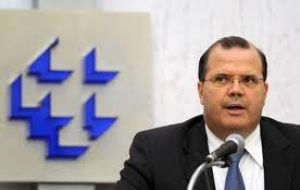MercoPress. South Atlantic News Agency
Brazil unexpectedly cuts interest rate to 12% on risks of EU and US recession
 The bank’s board led by President Alexandre Tombini voted 5-2 to cut the benchmark rate a half point
The bank’s board led by President Alexandre Tombini voted 5-2 to cut the benchmark rate a half point Brazil’s central bank on Wednesday unexpectedly cut interest rates as the risk of recession in Europe and the US shifted policy makers’ focus away from containing the fastest inflation in six years.
The bank’s board, led by President Alexandre Tombini, voted 5-2 to cut the benchmark rate a half point to 12% after raising rates at each of the previous five meetings. Although the change in tendency was anticipated it was not expected to be so sudden.
“Re-evaluating the international scenario, the Committee considers there was a substantial deterioration, reflected in generalized reduction of great magnitude in the growth projections for the major economic blocs,” policy makers said in their statement posted on the central bank’s website.
With today’s reduction, Brazil became the second country in the Group of 20 Nations after Turkey to lower borrowing costs in response to the worsening global outlook. On Aug. 26, Mexico also signalled that it may follow suit.
Brazilian President Dilma Rousseff this week redoubled efforts to control spending to help stem inflation that surpassed 7% in August for the first time since 2005. The government this week raised its target for the 2011 budget surplus before interest payments by 10 billion Real (6.3 billion dollars), after tax collection jumped by 30% in June and July.
Finance Minister Guido Mantega argued that such a move would “open space” for a reduction in interests rates, while Rousseff on Tuesday vowed to take Brazil on a “new pathway” of lower borrowing costs “starting now.”
Policy makers are betting that slower growth and declining demand from China for Brazil’s iron ore and other commodities exports will stem price increases without the need for further monetary tightening.
Tombini said he expects the inflation rate to start falling in September, and has pledged to hit the 4.5% mid-point of the bank’s target range by the end of 2012.
Following is the text of the statement issued by the central bank's monetary policy committee:
”The monetary policy committee (Copom) decided to reduce the Selic rate to 12.00 percent per year, without bias, with five votes in favour of the cut and two votes to keep the Selic rate at 12.50 percent. Re-evaluating the international scenario, the committee considers that there has been substantial deterioration, shown by, for example, generalized and large reductions in growth projections for the principal economic blocks. The committee understands that this increases the chances that restrictions that are today seen in various mature economies will prolong themselves for a longer period than expected. The committee also notes that in these economies, there appears to be limited space for the utilization of monetary policy and that a restricted fiscal scenario prevails. Therefore, the committee understands that the international scenario shows a bias toward disinflation on the relevant horizon.
”For the committee, the transmission of foreign developments to the Brazilian economy could materialize through various channels, among them the reduction of trade, moderation of investment flows, more restrictive credit conditions and worsening consumer and business sentiment. The committee understands that the complexity surrounding the international environment will contribute to the intensification and acceleration of the current process of moderation of domestic activity, which has already manifested itself, for example, in the reduction of growth forecasts for the Brazilian economy. Therefore, on the relevant horizon, the balance of risks for inflation becomes more favourable. Furthermore, the revision of the outlook for fiscal policy also points in that direction.
“In this context, the committee understands that by mitigating at this moment the effects coming from a more restrictive global environment, a moderate adjustment of the basic rate is consistent with a scenario of convergence of inflation to the target in 2012.
“The committee will attentively monitor the evolution of the macroeconomic environment and developments on the international scene to define the next moves in its monetary policy strategy”.




Top Comments
Disclaimer & comment rulesCommenting for this story is now closed.
If you have a Facebook account, become a fan and comment on our Facebook Page!